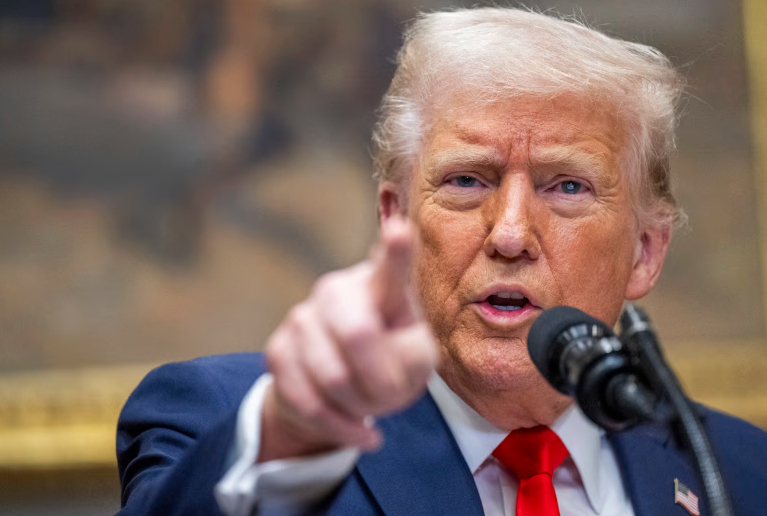
In recent years, tariff policies have been the focus of global economic attention, especially the 25% tariffs imposed by the Trump administration on Canada and Mexico, which has caused widespread market concerns and economic uncertainty. Will tariffs really trigger an economic crisis? Will Trump's trade war with Mexico and Canada derail the US economy? These issues deserve in-depth discussion.
First, Trump's tariff policy has had a significant impact on market sentiment. Since March 4, 2025, the US's 25% tariff on Canada and Mexico has officially come into effect, causing the Dow Jones Index to fall by more than 1,300 points for two consecutive days, intensifying market panic, and the Chicago Board Options Exchange Volatility Index (VIX) has risen sharply. Investors are worried that tariff policies will hinder US economic growth and trigger global trade frictions. Canada and Mexico have announced countermeasures, further exacerbating market uncertainty.
David Solomon, chairman and CEO of Goldman Sachs Group, pointed out that Trump's tariff policy is based on his concept of "fair competition environment", however, the final outcome of this policy remains uncertain. Economists generally believe that broad and substantial tariffs will push up U.S. inflation and could lead to a significant decline in GDP. The latest report shows that a 10% general tariff could cause U.S. inflation to rise above 3% in 2026.
Trump's tariff policy has a particularly significant impact on specific industries. Companies in the automotive and consumer electronics sectors, such as Tesla and Apple, will face higher-than-expected production costs. These costs will eventually be passed on to consumers, further pushing up inflation. At the same time, other countries may take retaliatory tariff measures, exacerbating global trade frictions and ultimately harming U.S. economic interests. The Bank of Canada has already lowered its benchmark interest rate due to uncertainty in trade policy and warned that broad and substantial tariffs will significantly disrupt the economic outlook.
The impact of the trade war on the job market cannot be ignored. New York Fed President Williams said that tariffs will push up inflation and may affect corporate investment decisions and consumer spending decisions, thereby having a negative impact on the job market. Market participants are concerned about the development of the U.S. economy, especially given a series of weak economic data in recent weeks. The ISM manufacturing index released yesterday showed that U.S. manufacturing activity growth in February was almost stagnant, inflationary pressures increased, manufacturers' ex-factory prices jumped to a nearly three-year high, and raw material delivery times were extended, indicating that import tariffs may soon hinder production.
Although U.S. Treasury Secretary Bessant expressed confidence in President Trump's wide-ranging tariff plan that the market decline will be temporary, historical experience shows that trade wars often lead to economic recessions. The Smoot-Hawley Tariff Act of 1929 is a typical example. The bill significantly increased import tariffs, triggered a global trade war, and ultimately led to the Great Depression.
Trump will deliver an important speech to a joint session of Congress on the evening of March 4, 2025, Eastern Time, and investors will pay close attention to clues about his future steps. Whether the Trump administration's tariff policy will be adjusted or will continue to move forward will have a significant impact on the global economy.
In summary, Trump's tariff policy on Canada and Mexico has already caused market turmoil and economic uncertainty. The risks of high inflation, falling GDP, increased corporate costs, reduced consumer purchasing power, and global trade frictions are all increasing. Although the Trump administration believes that the tariff policy will help create a fair competitive environment, the current situation shows that this policy may trigger an economic crisis and derail the US economy.

According to Bloomberg, a recent in-depth interview with Michael Dehal, senior portfolio manager at Raymond James' Dehal Investment Partnership, was released, focusing on the economic development prospects and potential risks of Canada and the United States in 2026.
According to Bloomberg, a recent in-depth interview with Mi…
TikTok Shop, the global e-commerce platform under ByteDance…
As a severe flu outbreak sweeps across the United States, w…
Recently, US Treasury Secretary Mnuchin publicly stated tha…
At the dawn of 2026, the United States launched a military …
From the stiff step when it first debuted in 2022 to demons…